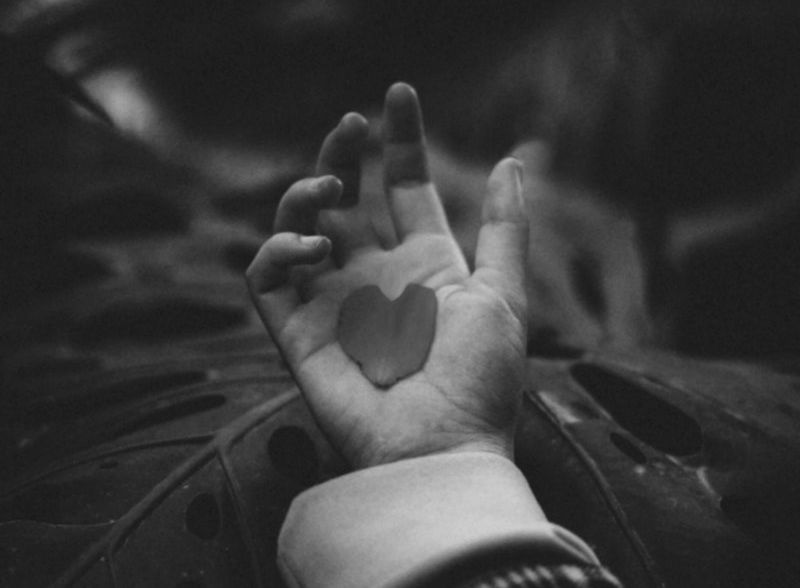At some point or another we’ve all heard these words before:
“Suck it up princess!” “Be a man!” “Stop being a cry-baby,” “Get over it,” “Stop being so sensitive,” “Get thicker skin!”
While these words were likely spoken without consciously intending us long-term harm, they nevertheless point to a common and undeniably tragic truth in our society: that expressing your emotions is a sign of weakness, rather than strength.

Soul Work Compass Course:
Feeling lost or disconnected? The Soul Work Compass guides you through a 12-lesson alchemical journey to transform emptiness into clarity and deep self-insight. Create your personal compass to navigate life with clarity, freedom, and soul-aligned direction. Start your Great Work today!
If you were born into an emotionally repressed culture that valued the “masculine” ideals of efficiency and logic, it is likely that you struggle with some level of emotional numbness.
If you were born into a family that shunned any form of strong emotional expression, it is even more likely that emotional numbing is an issue for you.
And if you experienced an extremely traumatic life event that was simply too overwhelming for you to handle (from which you haven’t recovered), I can almost guarantee that you suffer from emotional numbness.
So how does emotional numbness impact virtually every part of our life? And what advice can I share with you after going through my own struggle with this issue? Keep reading and you’ll find out.
Table of contents
What is Emotional Numbness?

Emotional numbness is a defense mechanism employed by the mind to avoid intense and overwhelming emotions such as fear, hatred, jealousy, and grief. When you go emotionally numb, you lose the ability to feel and experience your emotions on a psychological and emotional level. In this sense, emotional numbness is often clinically connected with dissociation, which is the disconnection from one’s memories, identity, environment, body, or senses.
What Causes Emotional Numbness?

As with most issues, emotional numbness goes back to childhood and the way we were raised by our parents. Being abused by our parents physically, emotionally, sexually, psychologically, or spiritually can contribute towards our inability to self-regulate emotions, which results in emotional numbness. Feeling alienated or disconnected from one or both of our parents, or family at large, can also contribute towards emotional numbness. Being punished whether directly or indirectly for expressing our emotions in childhood also creates emotional numbness.
Numbing our emotions may also start after a severely traumatic experience, such as witnessing acts of violence, being assaulted, experiencing rape, suffering intense loss, or anything that we didn’t have the capacity to psychologically and emotionally handle in the moment. For this reason, emotional numbness is often a symptom of PTSD and various anxiety disorders. You can take our free emotional trauma test to explore this further.
Want to get LonerWolf at the top of your Google search results?
Emotional numbness is also influenced by our culture and wider social circles, particularly those that emphasize being stoic, rational, and emotionally invulnerable (e.g., British, Chinese, American, Russian).
The Danger of Emotional Numbness

If you even have the slightest inkling that you might be emotionally numb, it’s time to listen up. Emotional numbness is not a small character flaw or minor area of self-growth to improve in – it is a serious problem which needs to be addressed immediately.
Speaking from experience, emotional numbness has formed the root of many issues I have faced (and still continue to face) in my life. Due to my upbringing in an emotionally stunted, dogmatically religious family whom I felt disconnected from for the majority of my life, I never learned how to handle strong emotions. I was punished verbally, emotionally or physically anytime I expressed strong emotions, and freethinking or any form of dissent was rejected, resulting in being ostracized.
The combination of having a British father and a mother who was traumatized by her own emotionally unstable mother – on top of an oppressive fundamentalist religion – led to grooming me as a stoic and “stable” person who was taught that expressing emotions was not only bad but shameful.
As you can see, sometimes there are numerous factors at play that may contribute to your inability to regulate intense emotions, and therefore resort to unconsciously numbing them. In my case, I learned that strong emotions = punishment in one form or another, and so I learned that they were dangerous to experience.
The danger of disconnecting from your emotions is that it can lead to a host of mental, emotional, physical, and spiritual issues. Such issues may include dysfunctional coping mechanisms (obsessive compulsions), mild to severe depression, spiritual emptiness, inability to enjoy life, inability to form close and fulfilling relationships, disconnection from inner self, confusion, irritability, fatigue, addictions, chronic illnesses, and somatic illnesses (illnesses produced by the mind).
In extreme cases (and I’m talking about situations where emotional contact is nil), emotional numbness can lead to acts of cruelty.
Why is it ‘the Secret Illness’?
I call emotional numbness the secret illness because it is so pervasive in our society, and so socially acceptable, that it often flies underneath the radar. In a society that largely doesn’t know how to handle strong emotions in healthy ways, being stoic and “level-headed” is valued – yet this very same calm and collected facade often conceals unhealthy detachment from one’s feelings. Thus, emotional numbness is a secret illness because so many of us struggle with it, yet don’t even realize that we have it until chronic issues start emerging.
Download FREE Worksheets!
Go deeper with an emotional numbness journaling prompt + printable meditation mandala!
13 Signs You’re Struggling With Emotional Numbness

Emotional detachment is not always a bad thing. It comes in handy when you need to maintain boundaries, avoid undesired energy overload from others, and even help others in crisis situations. But emotional detachment turns into its unhealthy twin (emotional numbness) when it becomes an automatic inner defense mechanism.
“What’s so great about feeling strong emotions?” you might ask. The answer is that without feeling our emotions, we don’t have the capacity to live and learn from them or experience the beauty and depth of life.
Would you like to save this?
Your information will never be shared.
Here are some of the most significant signs of emotional numbness that you should look out for:
- Inability to express strong negative or positive emotions
- Inability to “fully participate” in life (i.e., feeling like you’re a passive observer)
- Feeling that life is like a dream (a sense unreality)
- Living on autopilot
- Lack of interest in activities others find enjoyable
- Feeling distant from others
- The tendency to withdraw from friends and family members
- Emotions are only felt in the body as sensations, but not by the mind (or else are completely muted in the body and show up only as illness)
- Dislike of people who express strong emotions (both positive and negative)
- Not feeling anything in situations that would usually generate strong emotion
- Panic or terror when strong emotions eventually breakthrough
- Feeling empty inside
- Physical and emotional numbness or “flatness”
In extreme circumstances (such as in PTSD sufferers), emotional numbness may even influence the desire to commit suicide. If you are considering suicide, please seek out support immediately (click here to locate your country’s suicide hotline).
How to Overcome Emotional Numbness

Like any psychological defense mechanism, emotional numbing can be complex to deal with, and often requires support from a trained professional such as a therapist.
If you feel that emotional numbness is significantly impairing your life, please do an act of self-compassion and seek out support either locally or online (there are even free counseling services online such as 7cups).
For the time being, here are some helpful practices which I have personally found to increase my ability to feel, cope with, and express strong emotions:
1. Anchor yourself to your body
As mentioned above, emotional numbing is connected to dissociation (mental disconnection from one part of yourself). In my case, whenever I experience strong emotions, my automatic response is to either (a) only feel the emotions in my body, not my mind, or (b) to have a complete meltdown. In both cases, one of the best self-soothing mechanisms I’ve learned is to anchor myself to my body through mindfulness and physical contact. Similar to what a mother does with her child, I tightly but gently hold one area of my body – usually my hand or stomach. This method helps me to feel contained and grounded in my body.
I also recommend using shapewear or a pressure vest to help you in extremely emotionally turbulent periods to anchor yourself to your body (here is a good example of shapewear). Shapewear is used by women and men to keep “love handles” and other body parts slim and defined. For our purposes, shapewear is like a hug to the body that will help you feel safe and ‘held together.’ Pressure vests are a little more expensive and they are used by people with sensory integration disorders (such as autism) to relax.
2. Deep breathing
Whether used alone or in conjunction with the above-mentioned technique, deep breathing is a simple and easy way to help you mindfully move through whatever you’re experiencing. This practice is particularly useful when intense feelings such as fear or rage break through. There are many books out there that talk about the importance of deep breathing (such as this one), and there are many online tutorials with breathing techniques. I recommend sticking to something simple, something you don’t have to think about too much, and something that doesn’t feel forced. The point of deep breathing isn’t to follow someone else’s technique perfectly, it is to use your breath (in whatever way suits you), to calm your mind and body. Also, I recommend breathing slowly, deeply, and softly instead of forcing deep breaths (which can increase anxiety) – let your breath be natural. Read more about how to relax using deep breathing.
3. Keep a journal of sad thoughts

I realize this suggestion may sound a tad bit melancholic, but it’s a practice worthy of your time and effort, particularly if you’re wanting to feel and express your emotions. Journaling is also a powerful form of shadow work (a way to express what you would usually suppress).
In a physical journal or online diary, spend five to ten minutes every day writing down something which triggers even the slightest pang of sadness in you. For example, you might write down a memory of your dog who died, an issue in the world, something someone said to you, a scene from a movie, a daily struggle … or virtually anything that is upsetting (or what you imagine would be upsetting).
Creating a sad thoughts diary has two main benefits. One, it helps you express your emotions, even if in an indirect way at first. And two, it acts as a catalyst for feeling and letting out your emotions, particularly when you need momentum (I’ll elaborate more on this soon). Learn more about how to journal.
Always try to finish your sad thought journalling with something uplifting, like reading the uplifting news subreddit, spending time with someone you love, playing with a pet, or watching something entertaining on youtube or Netflix.
4. Catharsis (let it all out, baby!)
When emotionally numbing ourselves becomes our default defense mechanism, we tend to have a huge amount of suppressed emotion lying just beneath our conscious awareness. In order to safely and effectively express your suppressed emotions, try some form of catharsis. Catharsis may involve screaming into or punching a pillow, using your sad thoughts journal (mentioned above) to stimulate sadness and crying, intense emotional-fuelled exercise, impassioned dancing, or an active meditation.
Regular catharsis should be a must on your journey. Without regularly ‘letting it all out,’ you run the risk of experiencing the repercussions of festering emotions (i.e., depression, emptiness, chronic illness, etc.).
5. Yoga and self-massage
Yoga is a well-known way of helping to clear and balance your energy. Not only that, but yoga often has a way of releasing emotions stored in the body. I recommend doing slow and gentle forms of yoga such as Hatha yoga for at least ten minutes a day. Remember, the goal isn’t to become some Instagram-perfect yoga star; it is to connect with your body, mind, and heart.
The truth is that our unexpressed and repressed emotions are often stored within our bodies. I like to think of our bodies as being reflections of our unconscious mind: they are maps that help us to figure out what we are keeping locked away, and what unresolved issues we need to face. In my article about chronic muscle tension, I list the nine types of emotions trapped in different areas of the body. In order to release these emotions, I regularly use something called the ‘Acuball’ to introduce fresh blood flow and energy into these tense areas. I like the Acuball because it gives me a deep tissue massage, while also helping me to stay grounded in my body, relax, and release pent-up stress. (You can get the Acuball here).
6. Creatively express your feelings (or lack thereof)
Write a song, doodle in a journal, paint a picture, create a collage, find some way of expressing what emotion you last felt. If you struggle to feel anything at all, express that artistically. Grab those greys and blacks and turn that damn page into your own work of art. Pay attention to how you feel afterward. Does even the slightest feeling of satisfaction enter you? Journal about these emotions.
7. Take care of your inner child
As it was your child self that likely copped the trauma that caused you to default to emotional numbing, take care of this part of you. Practice inner child work and find ways of comforting and nurturing this vulnerable place within you. You may even like to create empowering affirmations for your inner child to help him or her access emotions. For example, you might repeat to yourself when you are in a difficult circumstance, “It is OK for me to feel,” “It is safe for me to feel sad,” “My anger is valid,” “Being vulnerable is being strong,” and so forth.
8. Dedicate space and time to feeling
In our busy lives, it is very easy to numb and distract ourselves with social media, the TV, shopping, food, social commitments, and other things that constantly cause us to look outside. Looking inside is much harder and requires far more self-discipline, hence why most people don’t do it. If you are serious about overcoming your emotional numbness, you will need to dedicate space and time to all of the activities I have mentioned in this article. If you struggle with self-discipline, I recommend making yourself externally accountable by joining a spiritual meditation group or other practice to help you turn inwards. Please don’t skip this step, it is imperative that you spend time exploring your inner self, and in particular, what you are repressing and why.
Emotional Numbness Q&A

Here are some commonly asked questions about emotional numbness. Hopefully they’ll answer any remaining concerns or thoughts you may have about this topic:
The simple answer is trauma. Usually, emotional detachment (or numbness) can be linked to early childhood experiences such as being abused mentally, emotionally, sexually, or physically. However, not everyone who experiences emotional detachment had tough childhoods. Sometimes, other traumatizing experiences later in life can trigger emotional detachment as a protective mechanism (such as divorce, job loss, rape, illnesses, war, etc.).
Yes, emotional numbness can mask intense feelings of anxiety – it’s the mind’s way of protecting itself from being flooded by overwhelming emotions. Numbness is a primal reaction to fear and is also known as the freeze response. There are three main reactions to anxiety-provoking situations that we have: fight, flight, and freeze.
To fix, or rather regain the ability to feel again, it’s important to be gentle with yourself. Try reconnecting with your body, practicing deep breathing, doing some catharsis, journaling, and creating a safe environment for yourself. Seeking out professional support is usually crucial, as emotional numbness is usually a major sign of a traumatized nervous system. To regulate your nervous system, you need a safe holding environment, which a professional therapist/counselor can provide.
***

I hope this article opens up new possibilities for you – or at least inspires you to take emotional numbness seriously.
I can’t emphasize enough how important it is to face this issue because avoiding it will only prolong your suffering.
If this article has helped you, please let me know. It brings me a sense of satisfaction to know that I am helping someone out there somewhere. Also if you struggle with emotional numbness and have other techniques or tools to recommend not mentioned in this article, please comment below. You never know how far throughout this world your advice can spread. :)
Please note that this article has affiliate links. If you decide to purchase anything we link to, we get a small percentage to help with our work at no extra cost to you. Thanks!
Whenever you feel the call, there are 2 ways I can help you:
1. The Soul Work Compass Course: Ready for deep transformation without the fluff? The Soul Work Compass provides a step-by-step path to finding your inner truth and life direction. Heal core wounds, clarify your values, and walk away with a concrete guide for living. Get started now!
2. The Inner Work Journal Bundle: Stop surface-level healing. Dive into the depths with 150+ journaling prompts designed to help you face your demons, heal childhood wounds, and embrace your shadow. Three sacred journals, lifetime access, print as many times as you need. Real transformation starts here.

 $3
$3
I have severe PTSD. I just started EMDR therapy. Luckily, my therapist also had PTSD so he knows from personal experience all the crap I’m having to deal with. The hellish nightmares, the sweats, the constantly-racing heart, the hopelessness, the ego-possession, the inability to feel love like I used to… He’s determined to help me, assuring me he won’t give up, no matter what. The problem we are having is getting me to feel anything at all. I went from hysterically crying, having flashbacks every day for a year-and-a-half, to feeling empty and numb, as if the crying, itself, cut me further off from my own heart. I can’t even identify bodily sensations, anymore. I have paid for soul retrieval. Didn’t work. I paid for reiki. Didn’t work. The worst part about those modalities was how, after taking what little money I had (I’m disabled), they blamed me because it didn’t work, which made me feel hopeless and suicidal. It seems I ran into a lot of insensitive, victim-blaming talk when I reached out to (no longer) fellow seekers. They are no longer part of my life. I know, now, never to be so cruel to anyone who needs to reach out to me, who has had their own brain turn against them, trapping them in their own personal hells. Studies show, in cases of severe PTSD and major depressive disorder, there is atrophy in the prefrontal cortex and a weakened connection between hemispheres. Excessive cortisol damages the brain. Excessive adrenaline damages the cardiac tissue. Telling someone to “change their attitude” while they’re being endlessly tortured inside, let alone unable to remember what it felt like to feel positive/hope, is probably the meanest thing a person can do to another. I forgive them for their ignorance but that doesn’t mean I am obligated to go back for a second helping. I asked my therapist if he had the same problem, before he overcame. He said “yes!” -that he also had major depression. He said it took a long time before he could feel emotions, again. But he asked me to hang in there and don’t give up. I used to feel the presence of the divine and their love. I haven’t been able to feel it in so long. I only want one thing: To be as sensitive and open as I once was so I can feel that divine love, again. I believe PTSD, since it stems from reinforced fear from trauma, is the ego / instinctual mind dominating. I have had the rare privilege of experiencing ego death, before the traumatic experience, and it was exactly the opposite – like being a newborn: The heart is fully open. The layers of armor, created by the ego, are burned away. You feel love for all things. It makes you weep tears of ecstacy. You feel connected to all. You feel cradled by the universe. Let me tell you: Once you have had that experience, you will want nothing from this material world. PTSD took that beautiful experience away from me.
I am so very sorry you are having so much pain now and that you have had experiences of betrayal when you reached out for help. I want to help in some way so I have a suggestion, but of course you need to decide if you feel it would be helpful. I don’t know if you have any pets or how you feel about animals, but in my experience I found so my Labrador Retriever to be so comforting. Their breed is especially kind and sensitive, loyal and loving. You mentioned that you are disabled and many times Labs are used to help disabled people as well. It’s just a thought for you to have “someone” to be connected to that will not be disloyal. You can physically pet and hold your dog and not feel alone. It may seem like a small thing, but I am grateful that my dog lies near me everyday so I don’t feel so alone. I wish you all the best and pray that God watches over you.
i am experiencing emotional deadness. My husband passed away after a long battle with cancer. He was my true love, and my true soul mate. We together accomplished our shared dreams in life. He has been gone for almost 3 years now and I carry on each day living our dream, owning operating our cattle farm and working on our cattle farm. I recently took a public job to get myself out of the rut I was in emotionally. Now that I am out and about I am meeting new people, and have been ask of dates. I’ve gone a couple time but my heart just don’t feel anything. I feel emotionally dead no happiness , no joy, no peace, no anger, not tears, just numb. and I go through the day zombie like taking care of my tasks like a robot.
You’re doing better than I am. I don’t trust myself around people, right now. I’m just straight-up feral. I can not control my spazzing. I used to be so disciplined. I feel like my brain is wreckt! My PTSD was caused by extreme grief, too. Cried hysterically for over a year as my lucidity gradually diminished. I don’t even know who I am, anymore. I don’t really want to be here. I want to be somewhere I can feel that warmth, again. Nothing, not even music, helps me. Not even spirituality, which used to. Not anymore. I feel soulless – just like a meat-robot, just like you. I don’t have the desire to get out and meet anyone, though. Right now, I can’t trust anyone. Everyone has crushed me. I’m just plain scared of people, now.
This was helpful thank you. I have wondered why I could lay in bed next to my wonderful wife and feel dead inside. It’s so frustrating. I’m working on it. It helps explain my thoughts of suicide when I was younger. I recently found a very helpful website with videos about complex trauma (tim fletcher in Canada on YouTube) but not the numbing. Aletheia I’m sorry you suffered spiritual trauma. I can’t imagine not having God to run to. I ran from trauma to God. For you trauma was associated with God. I hope one day you can separate the two. Tim Fletcher talks about spiritual abuse too. Take care, thanks.
This is a great article. I have suffered my entire life due to abuse and a sister’s death on my 7th birthday. I just have not been able to quiet my demons. I still have not given up hope though.
Very well-written! I will be utilizing the tips about using affirmations for your inner child and spending more time doing activities that connect with my body. Thank you for this! Bless you!
Well done!…you get an A+
I’ve always wondered what was going on with me. I’ve just recently in 2021 broken up from another relationship, since the partner wished to wait for someone else to break up and marry her. I felt tears pouring out, but other than that I didn’t even feel sad. I just felt numb, very numb.
The times when I was still alright, when I wasn’t struck with heaviest possible trauma, I was naive and very persistent… almost rebellious. I wanted to travel to another country to get closer to one I thought I loved, but at place I arrived I was alone. The one I thought would help me out never arrived. Instead I was picked up by a stranger and sold for prostitution. It took me several weeks and staying emotionally still, while hiding a stash of money I stole from the pimp, so that I could travel home asap. The moment I came back to home I cried the deepest cry I could ever fathom, then I felt incredibly numb, as if I was still battling my past.
I’ve had several therapy sessions in my life, but it’s understandable that therapists couldn’t see through the story I told them. They cannot understand the emotional toll it took me, but they only understood that I was still physically alive.
I’ve even become brutally honest. I stopped feeling embarrased for saying how many times I’ve had sex in my life… but then again it has made dating for me almost impossible. Who would want to date a destroyed product?
It’s something that I had to decide later on, being alone rest of life. It’s better than dating in a relationship that definitely never would work even if hell existed on the Earth.
I feel for you. I found spirit after 70 yrs and was ecstatic and shot to pieces when no one else felt elated. Wasn t that what so many reprimanded us about. Godless I heard. Long story short I too have no sex life for ten years except self satisfaction. The stakes are high. I hear christians and ministers are leaving
I feel I stand alone fresh in my vision. I listened to a mixed choir today and I thought man if they have exp. that same sacred sight how easy unity would be.
Behind me are abusive relations. The worst part is my natural good Will seems to have gone once spirit showed itself. It’s a tapestry as always.
The similarities of our childhood trauma is uncanny. I have started being triggered by repressed emotions at age 62. Their intensity is unpredictable and almost unbearable. Lately, I have realized that I’ve been numbing my emotions all my life, with family more than friends/strangers. Perhaps, that is because family was the source of emotional shaming throughout my childhood. As an older adult, I often feel the urge to “run” from personal and work situations when triggered by mixed and confusing emotions. However, I am doing a lot of private soul work, instead, to calm the flight responses. Thank you for sharing your own experience and the way toward healing.
I am going through this currently. Loss of a home. It takes me back to my childhood, my parents’ divorce, my father’s death when I was only 16. I feel like the walking dead, with moments of intense emotional explosions and nothingness in between.
Hiya! I feel like I have a really large issue with emotional numbness. I use to think it was a mental disorder, but now I look at it, I think this post is more what the problem is. Every time my vibration gets high and I feel like I’m on the right path spiritually, all the emotions just numb out. When I really try and reach into the emotions, I feel a sadness, like I could cry, but not that strong (or perhaps it doesn’t get that strong before it starts going under again). The wisdom this article brings seem really helpful. Just seeing how serious they need to be taken, it sort of makes me realise they deserve the work. It feels like my whole ability to see where I’m wanting and needing to go spiritually gets shut down by this. I’ve worked so hard to get it open, and I can’t stop now. This article gave me a way to go with it. It validated my need for shadow work and inner child work where it was just a fantasy before, to actually do the journalling and scripture and such. It’s what I really, desperately needed to hear. Thank you.
Whaaat
I wish I have found this article earlier… like 2 years ago… It was the time I’d moved out to live on my own, and all the mechanisms I’ve developed which helped me survive started to break down. After some time I found a love and I… like… exploded, was overwhelmed and decided to destroy my emotions. I never was the one to neglect them, I used them as my engine, but squashed them whenever they started to act against me. As stated in the article, the feelings in my mind were so well developed and so separate from the emotions in my body at the same time that I hadn’t really learned how to discern them, and more importantly to get along the bodily ones. Ahh, now I’m recovering, trying to feel any particular emotions instead of feeling as if I were stuffed with wad – I long for sadness the most, I think that’s because it’s the deepest buried emotion I have and the most important connection to my past identity. And what’s most interesting is that this system I had which allowed me to remain calm, switch to lower frequencies and pay attention to what mattered to me most was what I’d considered the differetiating factor and greatest advantage I gained from my life experience (loss of both parents, then a very neglective and “dynamic” :> kin family). What I hadn’t realised was that this system worked primarily in stressful situations, the rest of time I worked with what my parents left me, alone.
And I’d never say my emotions were numb, prob’ly because of those well-developed, detached cerebral feelings. They had a life on their own, and anything that touched upon those deeper emotions felt like a storm rumbling under a cover.
I was overwhelmed by alot of things and then I just couldn’t do it because it was too much so my brain just froze literally. I couldn’t feel anything yet I could and I didn’t care. I hurt people and didn’t feel a thing. It was like my emotions were there but I couldn’t reach them. I was brought back to reality when someone I love got hurt and it scared me shitless, the whole experience.
Yes my feeling too appreciated the encouragement to take it seriously.